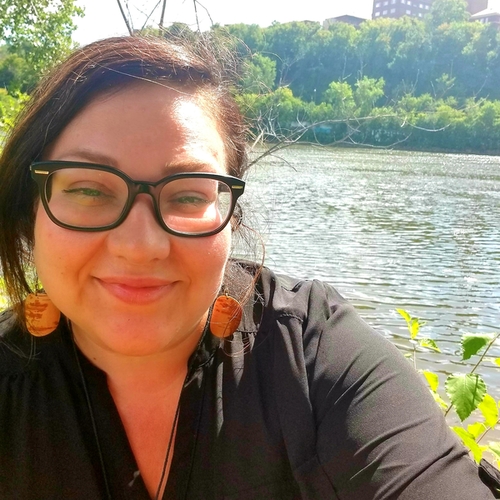An Garagiola-Bernier
Public Policy, Humphrey School of Public Affairs
Office of American Indian and Tribal Nations Relations
University of Minnesota Twin Cities
IAS Short-Term Fellow, The Mission of the Land Grant/Land Grab University
As a mixed-race Anishinaabekwe (Bois Forte) and disabled person, I perceive problems and craft strategies at the confluence of multiple worldviews. My passion is designing plans which help systems become more equitable, accessible, and sustainable for people who continue to be marginalized. At UMN, that means interning for Tadd Johnson on the TRUTH process.
UMN’s founding came at a dire cost to the Dakota people, and this has never been reconciled. Given the lack of respect with which the University has treated Indigenous people, in the summer of 2020, the Minnesota Indian Affairs Council (MIAC) issued three resolutions challenging UMN to address its problematic behavior towards Native Americans. That led to TRUTH, Towards Recognition and University-Tribal Healing, part of the Mellon-funded Minnesota Transform initiative. In consultation with the 11 recognized Tribal Nations with whom Minnesota shares geography, this is the first step in many the University must take to recognize the irreparable harm it has committed by stealing land and labor.
This is dually the site of my professional paper for the Masters of Public Policy program at the Humphrey School of Public Affairs. I am generating an international comparison of what has happened in the realm of higher ed related to truth and reconciliation processes and a best practices toolkit for a TRC. As a participant-observer in the TRUTH process, my Indigenous critical mind has many questions.
There are often discussions about “reconciliation” whenever institutional racism comes to light. However, when an entire institution is built on stolen wealth, labor, land dispossession, and genocide, can it truly serve as a site of reconciliation? While some actions can never be reconciled, there can be healing through nurturing relationality, telling the true history, and taking the opportunities to redress the balance of education in this state. It is incumbent on Minnesota’s flagship institution to own its entire past, including harms against Native Americans, and to dismantle institutional racism.
Learning with/from other Land Grant/Grab fellows has given me a greater perspective on my work, reimaging “reconciliation” through models of redress. Truth is just the beginning. An honest discussion about the University’s responsibility to Indigenous people will lead to better implementation of transitional justice for communities who have been institutionally harmed.
